For Stanzin Saldon, a 33-year-old social entrepreneur based out of Kargil who also goes by Shifah, conformity was never a strong suit. For as long as Saldon can remember, she always went with her heart and navigated through some rough waters with her independence intact.
She dropped out of medical college to pursue a career in social service. She fell in love, married a man of another faith, and converted to that faith of her own free will despite violent opposition from reactionary elements of the local Buddhist community in Leh. Today, Saldon is actively working for gender equality in Kargil, home to a largely conservative Shia Muslim community, while also improving public school education in this neglected corner of Ladakh.
“Ever since I was a child, I have usually gone with my heart. How I felt about certain situations, my urge to express it, and the spirit of social service are driving factors in everything. In hindsight, it does seem like I overcame difficult and sometimes life-threatening situations. But at the time, it didn’t feel that way,” says Saldon, speaking to The Better India.
Today, she runs rZamba, a Kargil-based charitable trust registered in 2017, which is working extensively in education, adolescent health, livelihood generation and youth leadership. Co-founded alongside her husband, Syed Murtaza Agha, and friends Fayaz Ali, Ali Asgar and Marzia Bano, rZamba has positively impacted the lives of hundreds of students.
“A woman leading an organisation, especially one engaging in social interventions, is quite a new concept in Kargil. In fact, the very idea of a developmental professional engaged in the work I’m doing right now is quite novel here. rZamba means ‘bridge’ in the Balti language. We are here to act as a bridge between people, resources, systems and each other,” she adds.
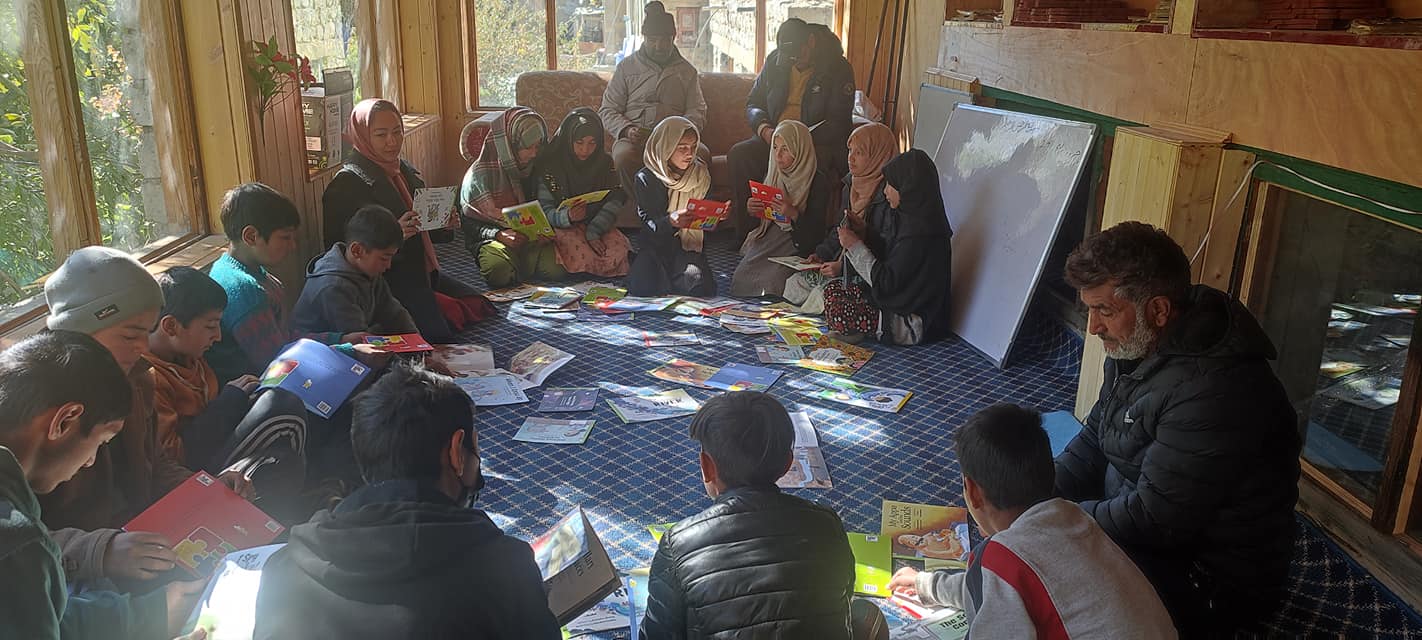
Finding her own way
While pursuing her MBBS degree at the Government Medical College in Jammu, Saldon found opportunities to volunteer with a couple of non-governmental organisations (NGOs) working with rural communities in the Jammu area. She had heard about these NGOs during a course in community medicine. Aside from enjoying the course and the experience of working with these NGOs in Jammu, she also realised that her strengths lay in engaging with people, understanding the needs of different communities, and strategizing social programs.
Taking a firm decision, she dropped out of medical college in her second year and enrolled for a Bachelor’s degree programme in social work through correspondence. It was sometime around the intervening months of 2014 and 2015 when she visited Kargil for the first time in a meaningful way. She visited with four of her close friends—Murtaza, Fayaz, Ali and Marzia—from Kargil and began engaging with children, local youth and their families through various workshops. During these engagements, she began learning more about the region, its myriad of challenges and informally launched rZamba in 2015.
In September 2015, however, she was selected for the American India Foundation’s William J. Clinton Fellowship and spent 14 months working with children, especially girl students, studying in government schools across Karnataka. As a Clinton Fellow, she supported government schools by creating learning modules for teachers and students on adolescent health education and building hygienic toilets for girls.
“With my AIF fellowship came some funds, which my friends and I utilised to support the Government Higher Secondary School in Drass. The money was spent on constructing a proper toilet for girls and building awareness among students and teachers about adolescent health and hygiene, particularly periods. While engaging there, we realised the need for a larger overhaul of the public education system in Kargil district. It suffered from inadequate infrastructure and low learning standards among students and teachers. Thus, by June 2017, my friends and I formally registered rZamba to focus on the big picture,” she says.
Between 2016 and 2018, she also worked as a senior programme leader at the New Delhi-based Kaivalya Education Foundation in the erstwhile state of Jammu & Kashmir, where she learned best practices to strengthen public school education.
In the midst of all this, however, Saldon’s decision to marry her husband, Murtaza, in 2016 and convert to Islam caused a massive uproar among reactionary elements of Leh’s Buddhist community and her family, resulting in the spread of communal tensions in the region.
There were times when the couple had to go underground. They even approached the Jammu & Kashmir High Court to prevent the police in Leh from tracking them down and bringing her back after her parents filed a missing person report.
“I find it very ironic when something like faith, which is supposed to give you courage, strength and peace, manifests in fear, anger and hatred. Faith is a personal matter to me. Whatever I am today is the byproduct of whatever I was in the past. I didn’t lose anything in this spiritual realm by converting. Today, I still conform to both Buddhism and Islam. In other words, both philosophies nourish my soul,” she recalls.
Despite the trauma of undergoing that experience, she continued to soldier on, working with the Kaivalya Education Foundation until 2018. After her stint there ended, rZamba began working with public schools, particularly in Kargil’s rural belt. They began conducting baseline assessments of different schools and learning levels of the students in Kargil (2019) to understand the key challenges and issues in the school system.
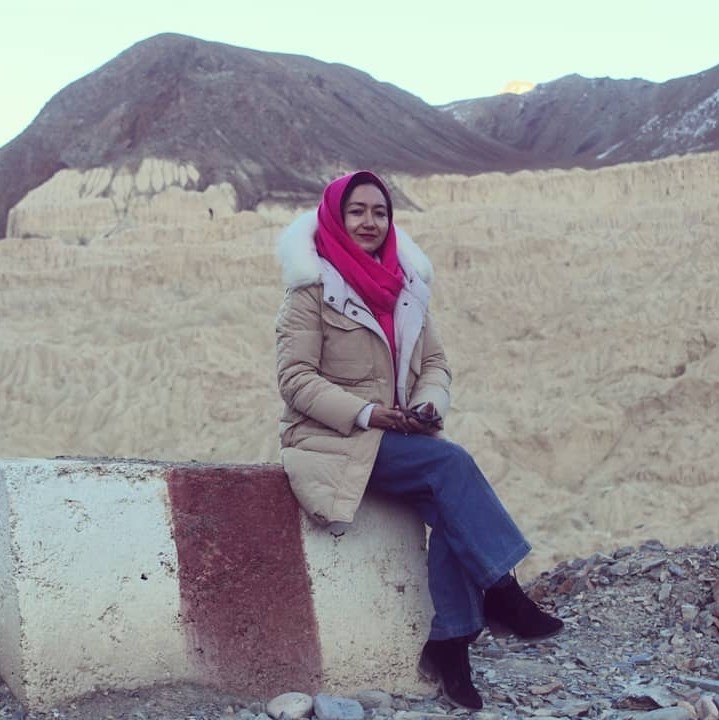
Working with Kargil
Even today, tourists visiting Ladakh would often stop at Kargil and ask ‘Ladakh Yahan Se Kitna Dur Hai’?’ (how far is Ladakh from Kargil?), not knowing that they’re already there. It was the Kargil War in 1999 that really brought the region into the national limelight. Developmental works there were largely stimulated by the war and how it was covered by the media, even though it has also borne the brunt of past wars in 1947, 1965 and 1971. Many villages in the Kargil district lie barely a few kilometres away from Pakistan-occupied territory.
Besides geopolitical challenges, the region suffers from roadblocks extending up to six months and poor internet connectivity due to heavy snowfall. Moreover, schools in the region are only functional from March till November, followed by a long winter break. Students in the region, therefore, have a very narrow window of learning.
But what began at the Government Higher Secondary School in Drass with building proper toilets and raising awareness about adolescent health has turned into a full-fledged initiative with a series of government schools in Kargil district, where 60 teachers have undergone intensive workshops and close to 1,000 students have benefited directly and indirectly.
“We have encouraged the inclusive engagement of adolescent boys and girls often together in a single room, allowing them to learn about the major changes both genders go through physically and emotionally during this phase of life. As a result, teachers also have experienced a major shift in their relationship with the adolescent kids at their schools, families and neighbourhoods. In fact, at many locations where girls were shy to express their stories and experiences, their male classmates motivated them to share. Boys also found the spaces safe enough to seek scientific explanations about sensitive topics like masturbation,” claims Saldon.
Kulsum Bano, a Class 10 student studying at the Government Higher Secondary School in Yourbaltak, Kargil, says, “Thanks to the people at rZamba, a lot of the fears I had in talking about my periods went away. We learnt that getting our periods does not make us dirty. This is a natural process of the human body. Talking about periods shouldn’t be taboo, and in society, we need to have more frank discussions about the same. In our society, girls are shy about talking about their periods and relentlessly teased even though it’s a natural process. For example, if a girl gets her periods in the playground, I’ve seen boys laugh behind her back. Today, I’d like to tell these boys to move with the times and change their mindsets.”
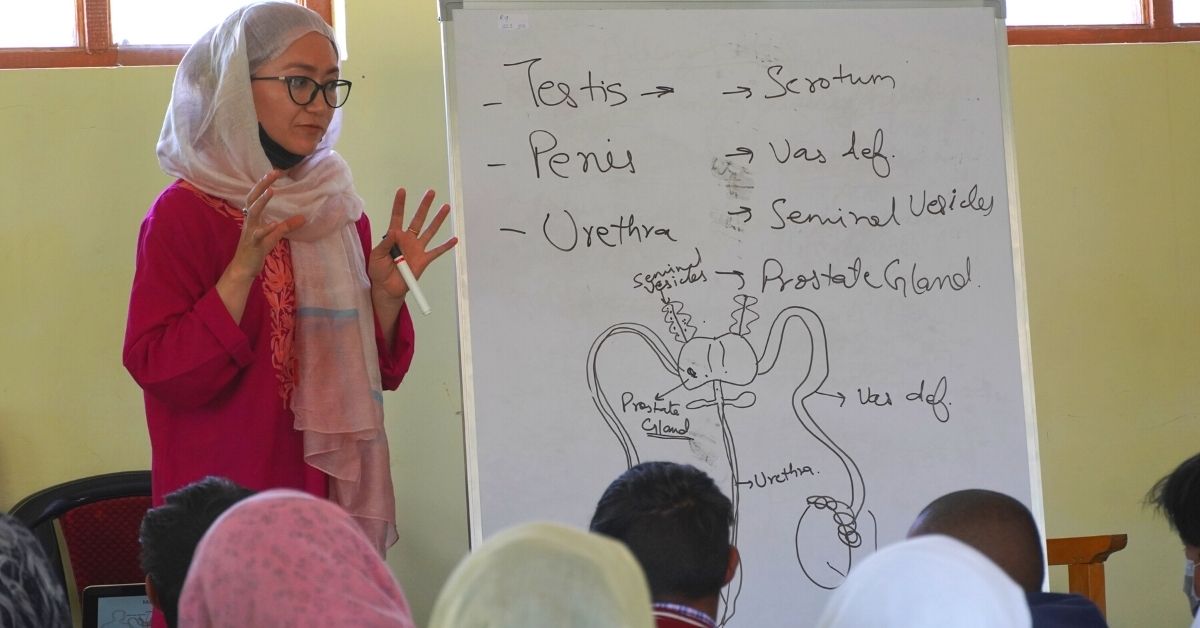
Another area of focus has been English language and socio-emotional learning levels. For example, in an assessment that rZamba did with English reading and comprehension for students between Class 9 and 12 (since English is the medium of instruction in most schools in Kargil), they found that 80% were unable even to read a simple single sentence.
“We collaborated with the chief education officer of Kargil, inducted headteachers from 16 primary and middle schools and trained them on simple yet very effective ways of establishing creative spaces in schools, starting with a school library and assigning reading/storytelling periods to every class. Out of those schools, one primary (Govt. Primary School, Choskore) and two middle schools (in Lobar and Poyen) have been adopted by rZamba to work intensively for three years and support the children with their English and socio-emotional learning,” claims Saldon.
For example, one such project organised for students between the ages of 4 and 8 had them imagine and draw an animal of their choice and then create a short storybook with their chosen animals. This is a project aimed at boosting their imagination and creativity. It also involves communicating with each other in simple English.
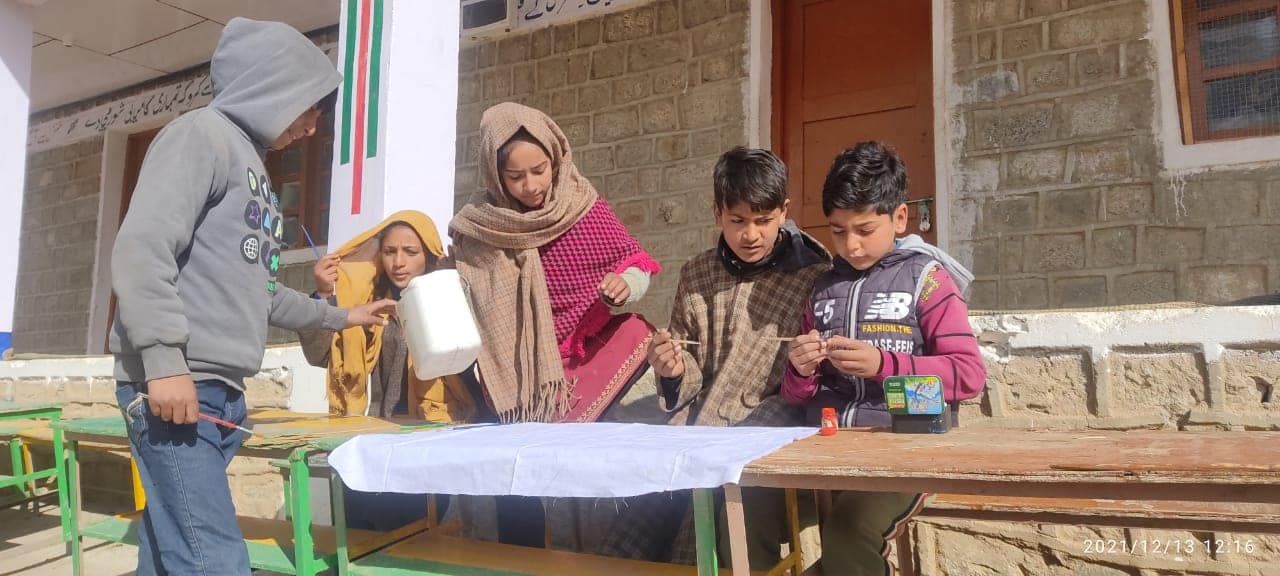
“The baseline assessments and the endline assessments after doing 15 such projects across different age groups showed immense improvement in the children’s learning levels. More than 70% of the children improved by 50% to 60% from their baseline learning levels. Project-based learning not just improves their basic literacy and numeracy but also boosts other soft skills like collaboration, creativity and asking questions, as recorded by our facilitators,” she adds.
“Back in late 2019, we invited the rZamba team to our middle school in Choskore Lobar village, where they helped us set up a library. Residents of this area largely come from economically weak and socially backward backgrounds. It’s a remote area and difficult for teachers to get here. Internet connectivity is very poor, and online education offers no solution. They don’t have the resources to acquire books from outside. Working in close coordination with the students, we created books appropriate for different age groups, like letters of the English alphabet for primary classes. Similarly, for older age groups across five levels, we created age-appropriate books. Before the pandemic closed schools, we would allow these children to take the books they co-created back home. We could see a marked improvement in their English language skills each week. This intervention proved invaluable for us teachers as well. If rZamba increases their workforce, they can do real wonders in the entire district,” says Sajjad Ali, who teaches English and geography.
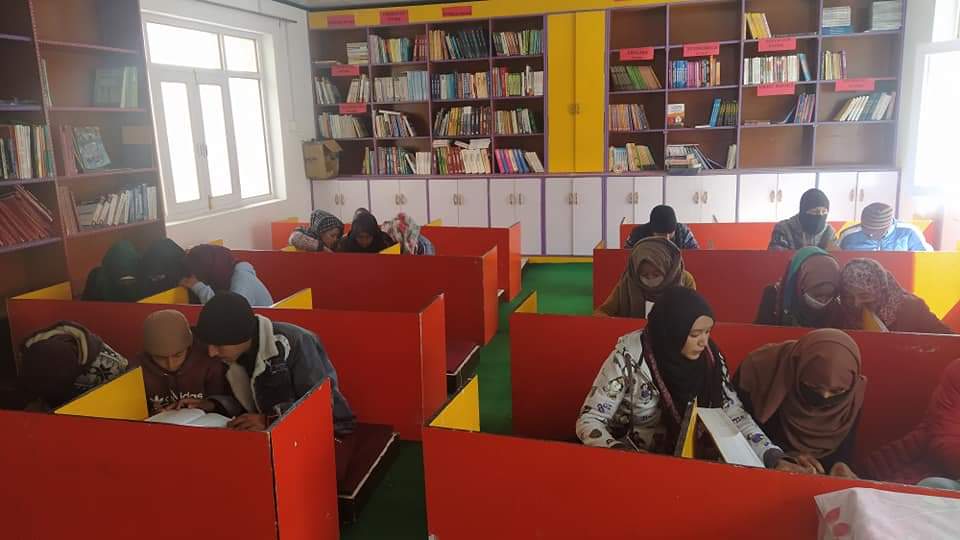
What they started in 2019 will soon be extended to all schools in Kargil in partnership with the Ladakh Autonomous Hill Development Council, Kargil. rZamba will soon sign an MoU with them.
In addition, since July 2020, they have collaborated with the chief education officer and district-level educational institutes to conduct training workshops for teachers and headteachers. They’ve even collaborated with local, national and international organisations to ensure quality services.
Muskaan, a student from the Central University in Jammu undergoing a Master’s programme in Social Work, finished her internship with rZamba as recently as July 2021.
“Saldon has set the standard for every non-profit organisation for her collaborative style of management. Her extensive work on the ground to ensure children enhance their learning capacities speaks for itself. While other non-profits are struggling during the pandemic, rZamba continues to make headway into remote communities that don’t have access to online learning with their community classes, project-based learning initiatives and interactive sessions with teachers and parents. What’s even more impressive is how they’ve navigated religious sensitivities nimbly, working closely with local communities,” says Muskaan.
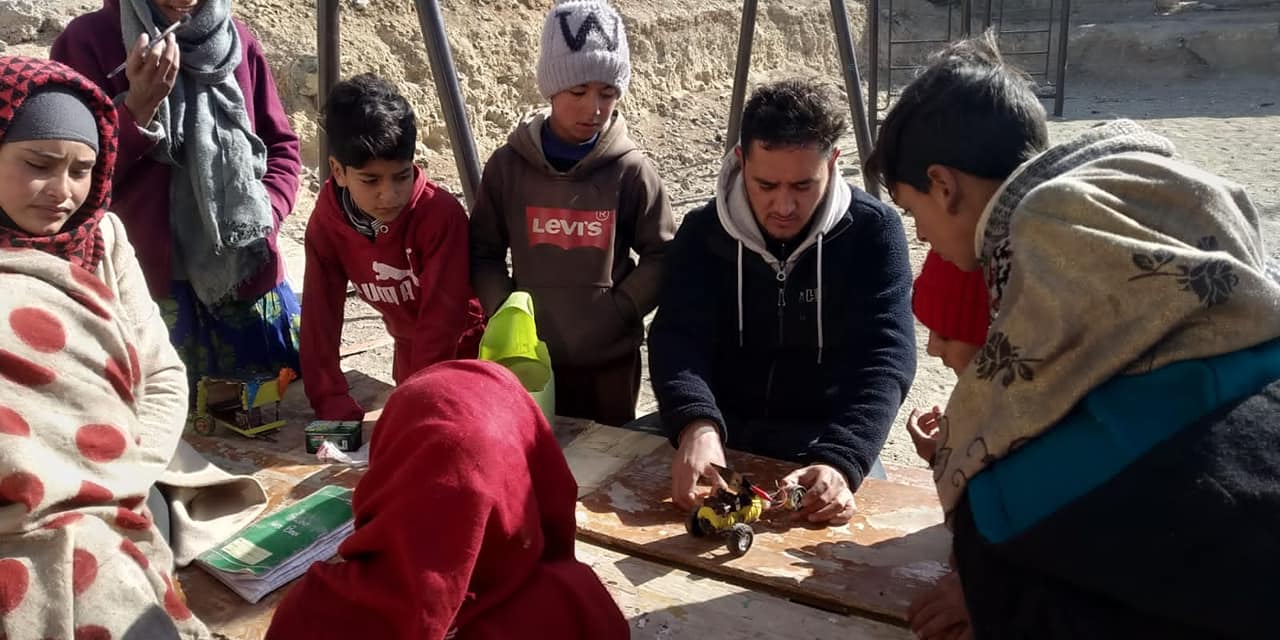
Sustaining Momentum and Covid
The fundamental challenge of every developmental programme is sustaining it. Irrespective of programme design, expertise and external funding, no initiative sustains without engaging local communities and building local resources. This is at the heart of what rZamba does.
Despite successfully carrying out these initiatives, they’ve had to contend with many roadblocks created by external events like the violent protests in Kashmir in 2016 following the encounter killing of Burhan Wani, a militant. Closer to the Kashmiri populace than their counterparts in Leh, there were definite spillovers of that violent protest in Kargil. Meanwhile, a curfew was imposed in Kargil following protests in the region challenging the abrogation of Article 370 in August 2019, resulting in school shutdowns and restricted movement. And then there is Covid, which has devastated students of this region, who don’t have access to adequate internet connectivity.
They organised donation drives for the local administration when medical stocks in hospitals ran low, sanitisation drives in villages and created Covid-related awareness material for local communities. They also joined hands with the District Education Office in Kargil to train teachers individually, to be well prepared once the lockdown was lifted.
“Ladakh also witnessed a reverse migration of professionals and students from different cities to their hometowns and villages. So we decided to leverage their time, skills and passion for teaching children in their homes. Working with them, we started ‘Khangrtsa Yontan’, a door to door project-based learning initiative through volunteer facilitators. Once the lockdown restrictions were eased a little after the first Covid phase, we also supported community-based classes in collaboration with the Chief Education Office to ensure learning continues even though schools were shut. So far, we have inducted over 200 volunteers in different villages largely in Kargil and engaged more than 3,000 school children through project-based learning,” claims Saldon.
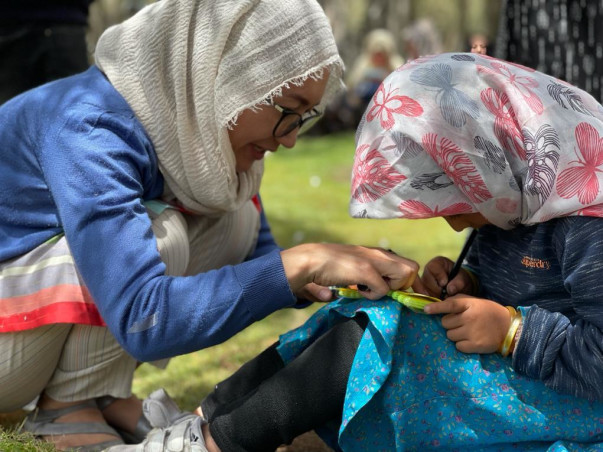
Looking Ahead
Given how long schools have been shut during the pandemic, there is a clamour among certain education experts for opening schools. In remote corners of Kargil district, where online learning isn’t really an option, the need for opening schools is immediate. Of course, this process requires careful calibration, but once it begins, rZamba will continue to make sharper inroads.
“Despite our work so far, it feels like we’ve just begun. There is still a long way to go,” she says.
(You can support rZamba’s excellent Khangrtsa Yontan initiative by clicking here.)
(Edited by Vinayak Hegde)
No comments:
Post a Comment